News Blog
Latest News From Our Volunteers in Nepal
VOLUNTEER COMMUNITY CARE CLINICS IN NEPAL
Nepal remains one of the poorest countries in the world and has been plagued with political unrest and military conflict for the past decade. In 2015, a pair of major earthquakes devastated this small and fragile country.
Since 2008, the Acupuncture Relief Project has provided over 300,000 treatments to patients living in rural villages outside of Kathmandu Nepal. Our efforts include the treatment of patients living without access to modern medical care as well as people suffering from extreme poverty, substance abuse and social disfranchisement.
Common conditions include musculoskeletal pain, digestive pain, hypertension, diabetes, stroke rehabilitation, uterine prolapse, asthma, and recovery from tuberculosis treatment, typhoid fever, and surgery.
FEATURED CASE STUDIES
Rheumatoid Arthritis +

35-year-old female presents with multiple bilateral joint pain beginning 18 months previously and had received a diagnosis of…
Autism Spectrum Disorder +

20-year-old male patient presents with decreased mental capacity, which his mother states has been present since birth. He…
Spinal Trauma Sequelae with Osteoarthritis of Right Knee +
60-year-old female presents with spinal trauma sequela consisting of constant mid- to high grade pain and restricted flexion…
Chronic Vomiting +

80-year-old male presents with vomiting 20 minutes after each meal for 2 years. At the time of initial…
COMPASSION CONNECT : DOCUMENTARY SERIES

Episode 1
Rural Primary Care
In the aftermath of the 2015 Gorkha Earthquake, this episode explores the challenges of providing basic medical access for people living in rural areas.

Episode 2
Integrated Medicine
Acupuncture Relief Project tackles complicated medical cases through accurate assessment and the cooperation of both governmental and non-governmental agencies.

Episode 3
Working With The Government
Cooperation with the local government yields a unique opportunities to establish a new integrated medicine outpost in Bajra Barahi, Makawanpur, Nepal.

Episode 4
Case Management
Complicated medical cases require extraordinary effort. This episode follows 4-year-old Sushmita in her battle with tuberculosis.

Episode 5
Sober Recovery
Drug and alcohol abuse is a constant issue in both rural and urban areas of Nepal. Local customs and few treatment facilities prove difficult obstacles.

Episode 6
The Interpreters
Interpreters help make a critical connection between patients and practitioners. This episode explores the people that make our medicine possible and what it takes to do the job.

Episode 7
Future Doctors of Nepal
This episode looks at the people and the process of creating a new generation of Nepali rural health providers.

Compassion Connects
2012 Pilot Episode
In this 2011, documentary, Film-maker Tristan Stoch successfully illustrates many of the complexities of providing primary medical care in a third world environment.
From Our Blog
- Details
- By Haley Merritt
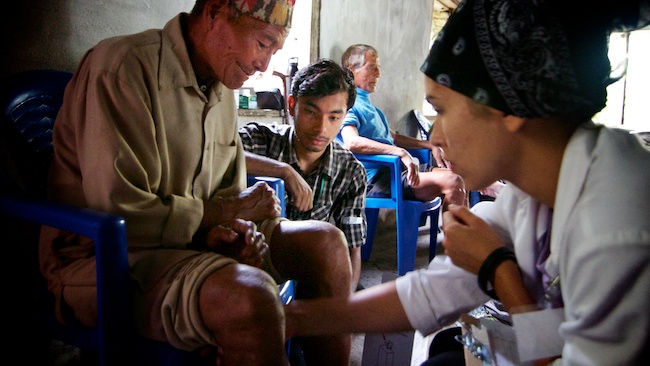
I’ll always hold space for Nepal in my heart, my soul and my hands. My hands because my hands are my tools, they are the hammers that deliver the nails (or the needles in my case) and they got a lot of action let me tell you. All of my experiences, including and probably especially the hard ones, have changed me in many ways. Some ways that I can see now and some ways that I think will continue to unravel as my life goes on. I didn't just improve my acupuncture skills, I became a primary care provider. Mostly, the experience taught me about myself.
It taught me about different ways of living or being that make it easier to understand what happiness is. I learned that I just need to relax and breathe it in. Be open and let it flow me. To cherish what I have and the people around me. It taught me a lot about cultivating true relationships and friendship.
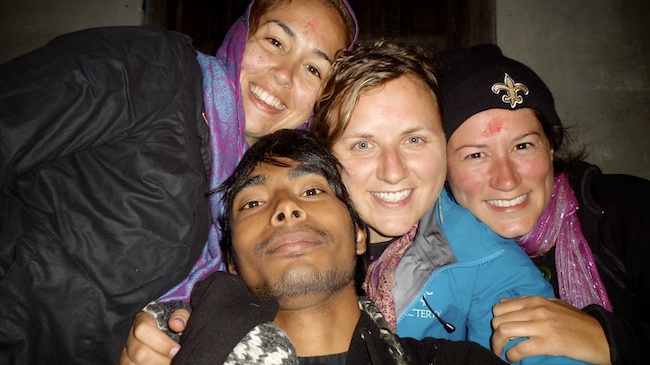
In Nepal, there is no hiding who you really are when you live with the only other five people for miles around who can speak the same language as you and you are totally cut off from the outside world. There's no getting all made up and putting in a cute outfit to look your best. There is no going home when you're tired, grumpy or uncomfortable. You show up everyday with grease in your hair and dirt on your face and you bear it all, good or bad. And you know what? People will still love and accept you for who you really are. I got closer to my clinic team than I have to many of the people who have come in and out of my life throughout the years.
Thank you Nepal for bringing these people into my life. Not only did this experience teach me about making true connections with the people I lived with; it taught me about connecting with people that don't speak the same language as I do, my patients and all the other people who live in Kogate.
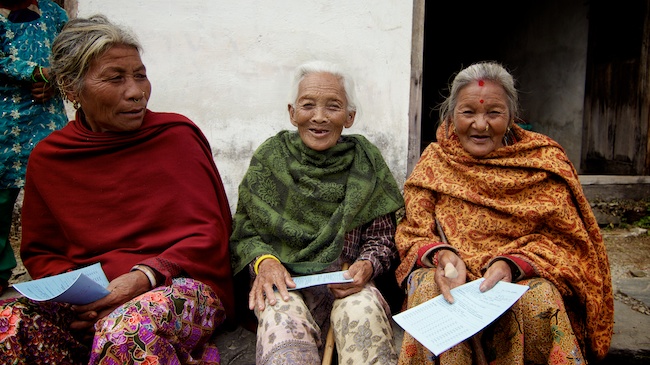
Nepal has some of the sweetest kindest people I have ever met. I felt so loved in Nepal. I was welcomed with open arms and opens hearts wherever I went. Something that I will never forget are the smiles of those people. They smile with their eyes, which offers you a glimpse into who they really are. A vulnerability, most people in the United States are unwilling or unable share. But its something that means so much and helps me to see how truly connected we all are.
We don't always need words to express compassion and love and kindness as long as we are willing and able to be open enough to connect with one another. The people of Kogate take care of one another they share and barter and feed each other. They drum and dance and sing together. They live off the land and appreciate what they have even if its not a lot and they make the best of it. Patients would come in so happy and excited that we where there to help them they would bring flowers, pumpkins, mustard greens spiny cucumbers whatever they could afford to give away. Most of all they gave us their love and kindness.
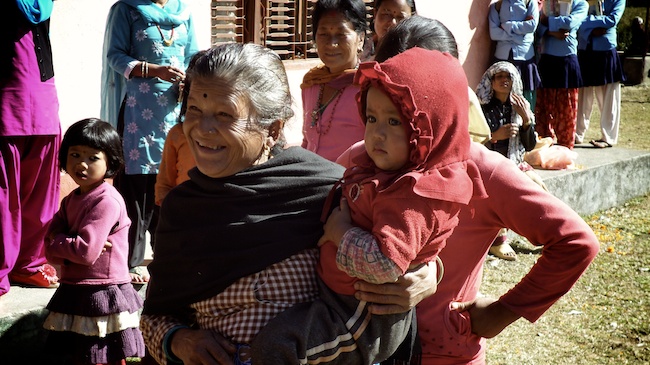
Although many of my memories of Nepal are silver lined, it wasn't always rainbows and sunshine. Literally it rained for most of the first month we were there. Some days where a real struggle for me. Living without all of the comforts of home took some getting used to I won't lie... I had to let go a lot of fear. Especially my fear of of bugs because they were everywhere including my hair. They existed in all shapes and sizes but I especially remember the giant ones. I had to sacrifice my ankles to leeches and bed bugs as a peace offering to the insect community. I had to let go of some of my control issues as nothing in Nepal seems to work right or on any sort of time schedule. Plans are just an outline for what you'd like to have happen but Nepal defies any sort of structure you may lay out.
This lesson made itself apparent even into my last days there as Nepal is having its first elections since the end of a long civil war that only ended a few years ago. There was a mass transportation strike around the country and I wasn't sure if I would make it to the airport in time to catch my flight home. And as much as I rant and rave about the people and my patients and their kindness, there’s always an exception to the rule.
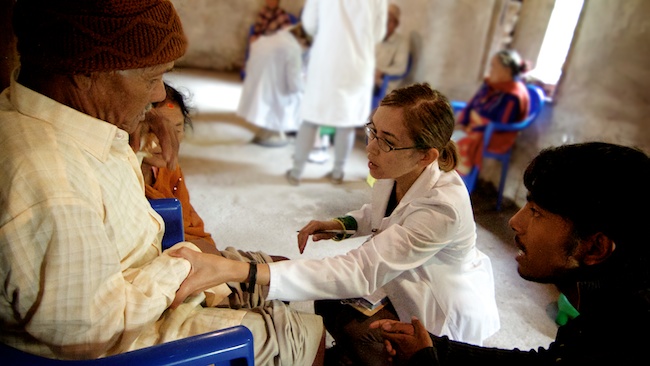
This was made apparently clear to me by one of the patients that I treated the most. He came into the clinic everyday. He was suffering from the effects of a stroke that he had last February. He lost his ability to say anything but the phase la in Nepali, which means ok. He had also lost most of the mobility of the right side of his body. He was a very angry man and rightly so. I can only image how frustrating it would be to lose so much of who you are. He got frustrated easily with my treatments because they were often painful and his anger and pain was palpable in my heart. I found it so difficult to treat him as I absorbed his frustration and I quickly became physically and emotionally drained. I found myself dreading the thought of treating him everyday. I discovered that I have a habit of looking to my patients for acceptance and I wasn't getting that from him. I began to close myself off from him, but of course this only made my treatments with him more uncomfortable.
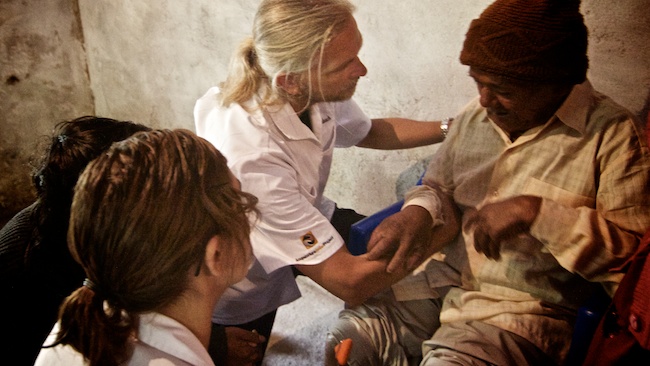
I spoke to Andrew (our project director and team lead) and he talked to me about the importance of just holding good space for people and keeping an open heart. That sometimes the largest role we can play in our patient’s lives is just showing them that we care and are there for them. This really resonated with me. Suddenly, it all made sense. All I really had to do was show him that I cared about him, that I wasn't trying to hurt him. I was really trying to help and that I was invested in him getting better. Once my attitude changed toward him, he changed his attitude about his treatment and me. He was no longer so angry. He was actually pretty happy when he came in which the whole team noticed because previous to my change in heart, he would often yell out in anger. He was also making great progress in his recovery. He regained the ability to walk on his own, he had started saying more words and he had an increase in active and passive movement of his right arm.
This was an incredibly important lesson for me to learn about patient-practitioner relationships and it was also one of the hardest and most uncomfortable experiences I had in Nepal. It just goes to show that from suffering comes growth.
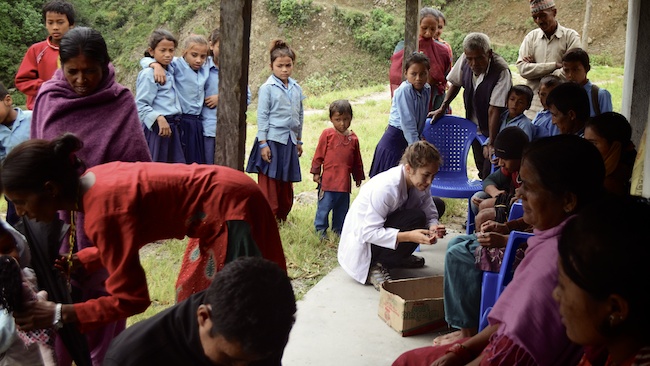
Nepal has taught me countless lessons. First and foremost, I want to remember that humanity is beautiful, don't ever give up on it. There is an incredible amount of people in the world ready and willing to freely share their kindness and love with you if you’re willing to share yours with them. Nepal has also taught me to "Harden the Fuck Up!" (a phrase we would commonly tease each other with when someone was whining a little too much). I don't need every luxury in the world to survive or to even be happy and often what I think I need is what ends up impeding my happiness. I am a lot stronger than I ever thought I was and that is truly empowering and liberating thought. As reflected on all that my Nepal experience has taught me, I can’t wait to bring these lessons home and apply them to my new life as an acupuncturist... and most of all as a human being. - Haley Merritt
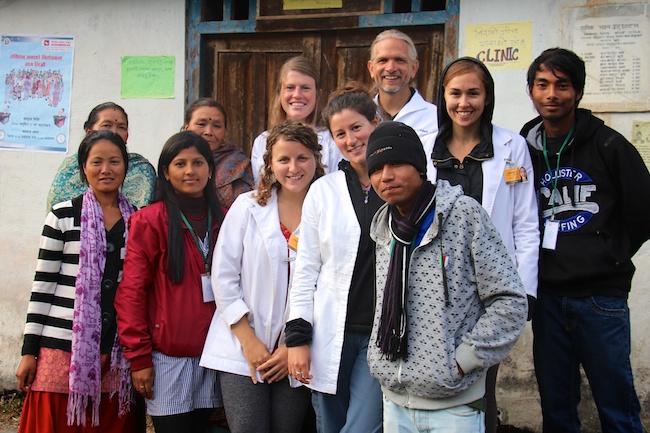
- Details
- By Allissa Keane
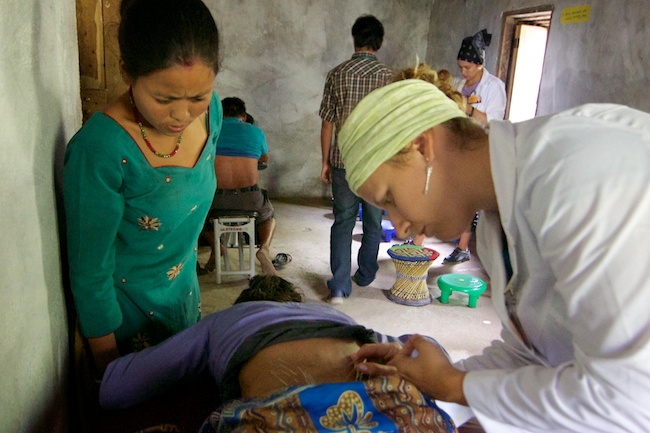
For the record, this is my second time writing this blog post. I wrote one a couple of weeks ago and Andrew had politely given me some feedback on it, called it fluffy, and asked me to consider rewriting it. Something about me not realizing how much I had grown here in Nepal, and sort of missing the boat on that in my first attempt. Needless to say, I was disheartened by his comments and stewed for a few days over them. I had already been through so many challenging experiences at that point and I wasn't really up for delving deeper anymore. But as I have learned (a few times over) there really is no where to run and nothing to distract you here in Kogate, Nepal. It's like acupuncture bootcamp, complete with mental, emotional and physical components.
So what do I write about then? I still had about a week and a half here, and to be honest I wasn't feeling particularly inspired by anything. Don't get me wrong, I have had many many amazing experiences while in Nepal that I will cherish forever. But sometime in this past year I stopped connecting with my heart. I felt exhausted, and therefore I would remain emotionally detached from pretty well everything to avoid the exhaustion. Unfortunately this detachment showed up in clinic, and I was having a hard time connecting with patients. I didn't recognize this disconnect until it was brought up via my initial blog post. So a few good cries and emotional talks later, I had arrived. Now this still is no big, ah ah, blow my mind, breakthrough moment. It did however spark a little something that I only expect will grow with time. But maybe those are the best kinds of insights.
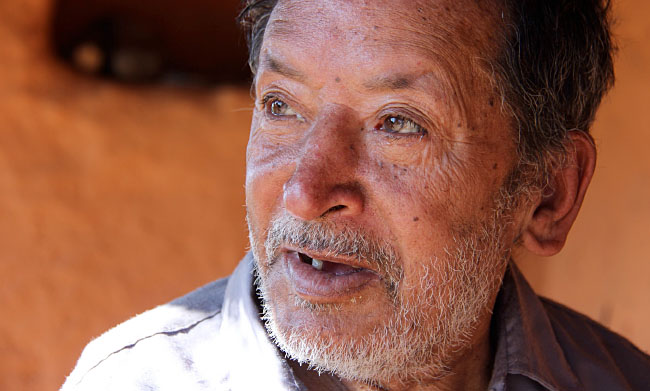
I have written about Bim before in my personal blog, I've treated him a few more times since then and gotten to know him a little more. He is a man that we see on our way to the village of Ipa, where our outreach clinic is. Bim is actually the reason that ARP is here in Kogate. He initially started travelling seven hours to the Chapagoaon clinic for treatments when ARP was practicing there. His family told ARP that they should come to Kogate to practice, and 9 months later here we all are. Thanks to Bim, he is the reason so many people have received medical attention.
One of the last days that I was to go to Ipa, Andrew gave me one of his insightful speeches. He told me that this man is surely dying, he will not live much longer, and he really hasn't had the best quality of life these past four years. So today, your charting and point selection really doesn't matter. What matters is that you make connection with him. I'm thinking to myself...is this about me? Or is everyone getting this inspirational speech? No, I was right, it was specifically for me.
The treatment went as usual. How are you feeling today? Any noticeable changes? How's your sleep, breathing, bowel movements? Bim began telling me about how tighten and painful his legs were, and when I touched them I could feel the bow strings that were his tendons. I learned that he has been in a contracted sitting position pretty well ever since his disease became debilitating. Bim is always seated outside when we come so I started asking his wife how she gets him in and out of the house. He has a large family, but they are not always around to help them, so it is up to her to care for her husband of 42 years. She looks to weigh about ninety pounds, and is not in optimal health herself. She says that she has to drag him in and out of the house when she has no help, so he spends his days on the front porch. I was sitting there beside Bim listening to this, wishing that his family would be of more help to them, but who am I to judge this family. They are as supportive as they can be.
Then an idea struck me as I was listening to Suman, my interpreter, change my English words into Nepali. Suman looks pretty strong, and I've got some muscle on me to, what if we took Bim on a walk? Right now? Why expect the family to do this if were fully capable? So that's what we did. With one of Bim's arms over each of our shoulders we picked him up and walked him around their small courtyard. Because he was only able to use his tip toes we were pretty well carrying dead weight. It was substantially more challenging than I would have thought. It was only a short walk, but here's the best part; when we sat Bim back down in his spot, his face was beaming. I have truly never seen such gratitude on someone's face. In that moment I was more than humbled.
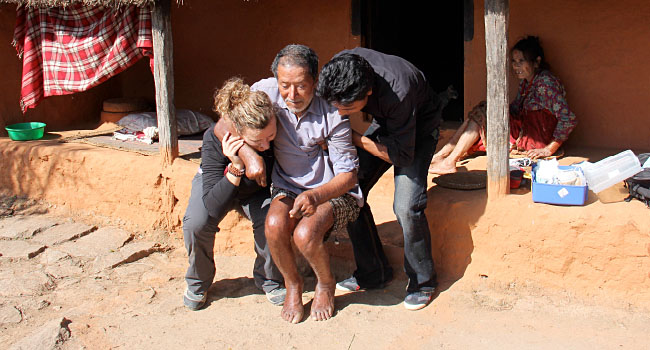
This story isn't about this cool thing that I did to make a sick man smile, and it sure isn't a pat on the back for myself either. Actually anytime that someone has told me how proud they are of me for what I am doing for the people of Nepal I want to say, thank you, but it's quite the opposite of what you think. It's more like this: I've been changed by the people and experiences here in Nepal. So be proud of Nepal and people like Bim for giving me the opportunity to come back to my home and be able to share with you all how to become more heart connected to oneself and others. - Allissa Keane
- Details
- By Tessa Concepcion
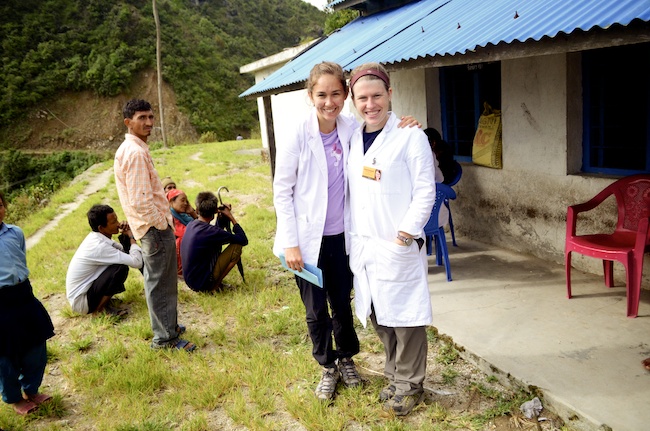
I know many people that travel often and tell stories about their 'breakthrough moment' or an 'epiphany'. Friends and family told me, when I was leaving for Nepal, that I would have amazing experiences and it would change my life. I have no doubt that this will be a life changing experience, or that my time here will be amazing. However, in my head, as I was boarding the airplane and imagining all the things that would come. I daydreamed of sitting on top of a hill and having the meaning of life showered upon me. I would break down from some hardship and then see the light through the darkness of my despair.
So far, none of that has happened. Instead, I've been learning lessons little by little. They sneak up on me, so much so that I don't realize I'm learning them until I look back and realize I've changed. It reminds me of how my mom presents an idea to my dad. If she gives the idea outright, with all its facts and all its information, he shuts it down right away. However, if she gives him little tidbits, subliminal messages, and offhand comments, in time he comes to the exact same idea or conclusion on his own.
This happened to me in Ipa (or Epa, even Nepali's can't come to a consensus on the spelling).
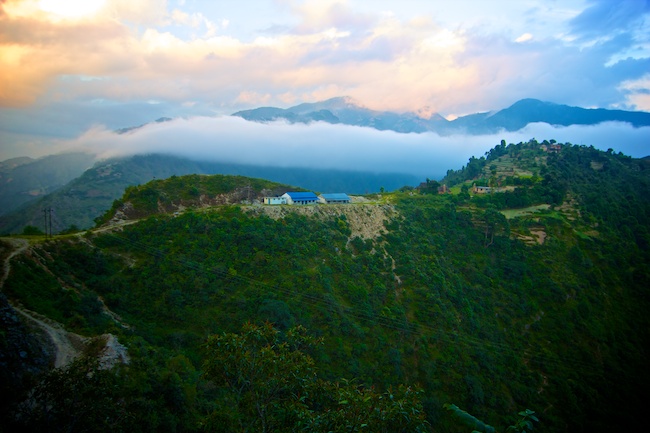
Ipa is our outreach clinic. Every Monday and Thursday we trek an hour and a half along the dusty, rocky, uneven road. The walk there is "Nepali flat", meaning there is very little elevation gain in the end, but you will rise and fall hundreds of feet along the way. Our walk to Ipa on October 24th was sunny and hot. We had butterflies flitting around us and grasshoppers jumping around underfoot. Leeches, thank goodness, had abandoned the hot dry grasses. Four of us walked to Ipa that day. Andrew, Allissa, Ritesh, and I. Two practitioners, an interpreter, and a pre-medical student/assistant/odd jobber.
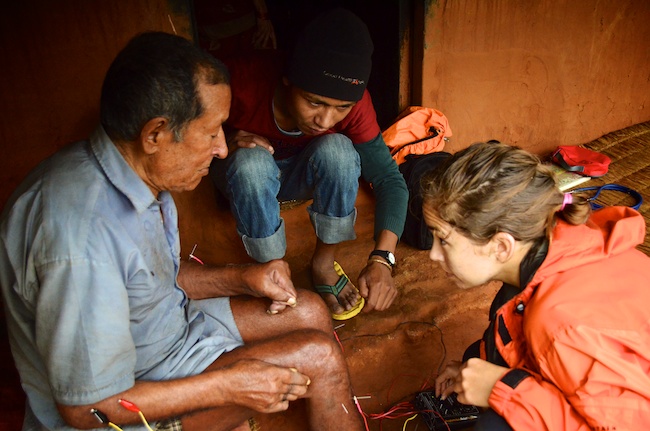
Our first stop, as with every time we travel to Ipa, was about an hour into the walk. We made a house call to a man who has a neurodegenerative disease. We suspected, with our limited technologies, either Parkinson's or Multiple Sclerosis (MS). Allissa did an acupuncture treatment on him, and his son brought out fresh honey that they'd harvested from the wall of their house. It tasted wonderful. We broke off a piece of the fragile honeycomb and stuffed the whole thing on our mouths. Occasionally a larva got thrown in the mix, but it's just a dash of protein, right? The honey at the house in Ipa was particularly delicious after a long, sweaty walk. The sunlight glinted off both the metal plate and the golden honey, making the entire presentation seem all the more appetizing. We sucked out all the sweetness possible until we were left with only wax, which actually makes for a pretty good chewing gum substitute.
After we treated the man, we continued on to the school house where we held the main outreach clinic. We took one room of the two room school building and used it as a treatment room. Chairs were set up outside and inside a platform with two mats. About half of the patients we treated outside, sitting in the plastic chairs.
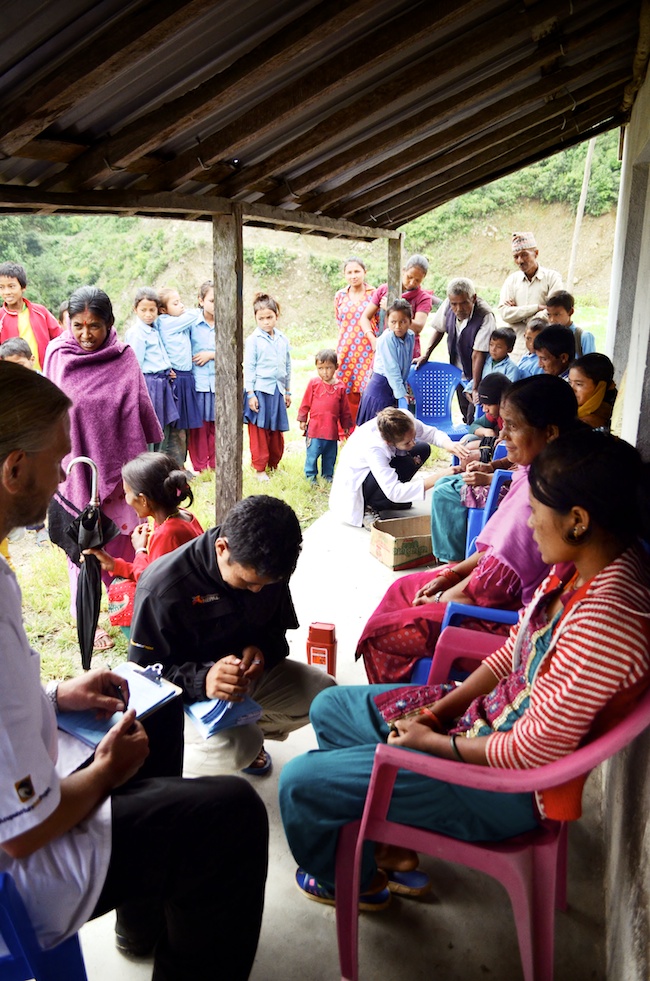
The community likes to hang around and watch our clinic work and we encourage it. Patient confidentiality and privacy here takes a backseat. It's more important for us to be open, honest, and visible to the community. They take comfort in their friends and family being with them. In some cases, privacy is preferred, and we always accommodate for that. In Ipa, The school itself is set on a ridge with the "road" traveling right in front of it. Some of the community members or patients sat on the edge of a cliff, squatting or sitting, oblivious to the extremes of their environment, content with watching us work, gossiping, and looking after the babies of those getting treated. A pleasant breeze washed over us from over the cliff, it was especially welcomed on the hot day.
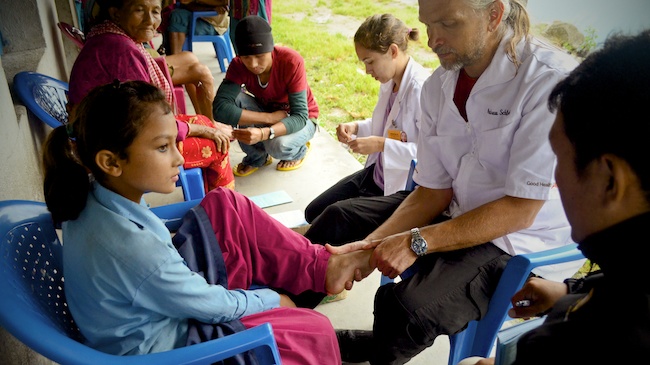
Our first patient at the clinic was a small girl with diabetes. The first time we tested her glucose it was 525. The second time it was 320. The third, it was back up to 500s. Her glucose was dangerously high and we had been trying to write to some doctors in the US about what type of medicine she needs. That day in Ipa we didn't have any glucose strips left in order to test her blood sugar levels. We performed an acupuncture treatment and said that we were working with some doctors in America to help her. She had the most amazing attitude. She hung around our clinic the whole day and our little inside joke was “yes dukchaa” which combines English “yes” and Nepali “pain” or we said “no dukchaa”. Often she would point to objects and say their name in English, showing her intelligence and eagerness to learn English. Her and I developed a great friendship that day. She started holding my hand and tugging at my hair, running away and giggling after. At the end of the day, she walked us part of the way back and then handed me a note. It was pretty long, and written in Nepali. I had Ritesh, one of our interpreters, transcribe it for me.
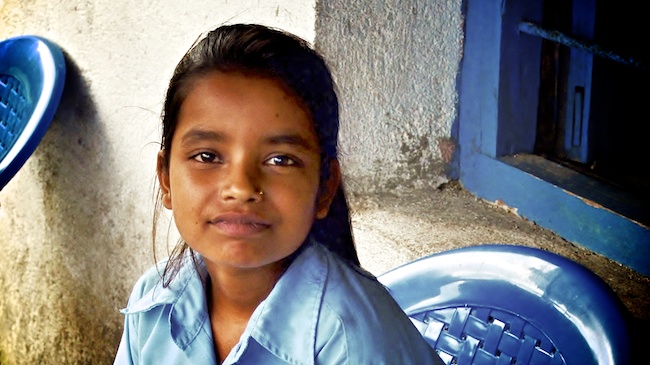
Here is what it said:
I am Babita Basnet. For the good health of Nepal, namaste to the well wisher [this is a respectful greeting]
Hello (Namaste) Doctor
I am 13 year old kid born in a poor typical Nepali family. I have been having sugar disease or blood sugar disease since I was 11 years old. I am always worried (scared because she had this problem). I am very interested in studying and I love all sorts of extracurricular activities but I am very worried and scared because I have been attacked by this sugar disease since I am very young. What should I do? Our economy is no good. I can’t go to many places to have my medical tests and till now I have been managed with medicines. Sometimes I feel “what will I do?” when I can’t afford for my medicines. I am just scared. Will my problem (disease) ever be solved (cured)? I don’t think so if I can’t get a good medicine that will help me with my disease. I always use insulin but it burns me and it hurts very much. How long will I have to live with this pain? I am not able to concentrate on my studies because of my family’s condition and stress of my disease.
Love
Babita Basnet
Epa, Pachkanya-6
Makwanpur
This little girl, who had been so chipper and playful all day, described her fears and anxiety over her life-changing disease in under 200 words. I didn't know what to do. I felt pretty helpless when I was reading her letter.
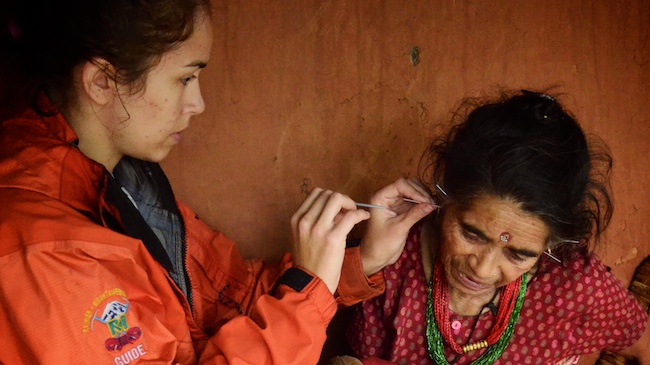
One of the hardest things to do here in clinic is to tell someone we are unable to help their problem. It's one of the most important things a doctor can do: honesty. On Thursday we met a lady who had a fever four years ago. During the course of her fever, she was hospitalized and lost hearing in her left ear and partially in her right ear. She came to us with a couple other complaints: headache, body pain. I looked in her ears and the ear canal and tympanic membrane looked normal, if a bit opaque. There was some redness in one and a small amount of moist earwax. None of this should have caused partial or complete hearing loss. We used a tuning fork to do a basic hearing test and it confirmed her partial and complete deafness. Andrew looked at her and said “We will not be able to fix your hearing. The fever likely caused permanent damage to the auditory nerve, something that is deep inside your brain”. As Ritesh translated you could physically see her face fall.
Often times our patients view us as magic workers- able to fix anything. We bring our foreign clothes, foreign faces, and foreign medicine. They come to us, sure that we can fix anything. They have so much hope when they come to the doctor. She had hope that we could fix her hearing through treatment. The same treatment that is fixing her husband's body pain, her mother's headaches, or her friend's menstrual irregularities. But we can’t do everything. And we had to tell her that. You could see on her face when she realized the permanence of her situation. She had to reroute her future plans. Everything that she had hoped would return vanished with our words and she had to imagine her future with only partial hearing in one ear. For the rest of her life.
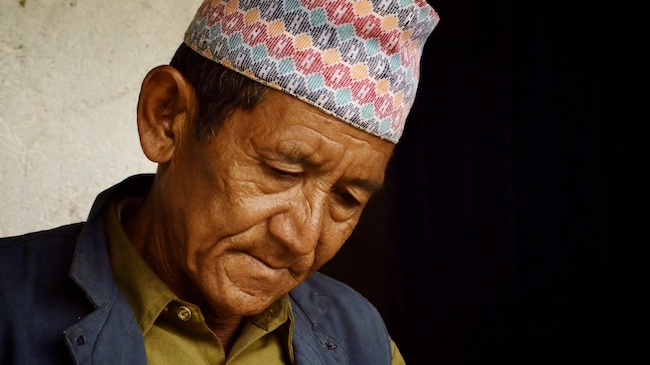
We’ve told people this before, and I've always known the value of honesty in the clinic. But this was one of those "snuck up on me" moments. When I look back at all the previous times we've been honest with our patients, regardless of the news, I see the value of doctor-patient honesty with a new clarity. We bring hope, compassion and our expertise. But sometimes we also bring bad news, disappointment, and heartbreak. -Tessa Concepcion
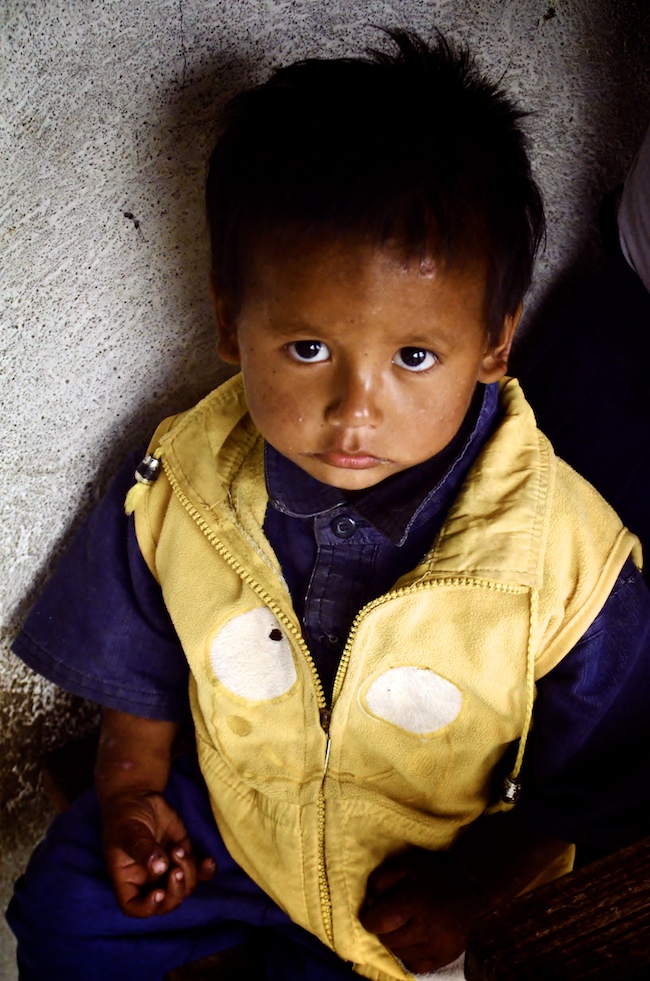
Our Mission
Acupuncture Relief Project, Inc. is a volunteer-based, 501(c)3 non-profit organization (Tax ID: 26-3335265). Our mission is to provide free medical support to those affected by poverty, conflict or disaster while offering an educationally meaningful experience to influence the professional development and personal growth of compassionate medical practitioners.
